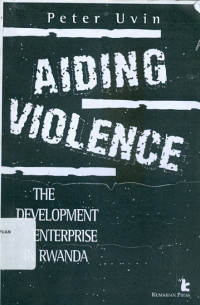
Text
Aiding violence : the development enterprise in Rwanda
Peter Uvin shifts focus from the role played by the international community in responding to the Rwandan genocide of 1994 with humanitarian aid, to consideration of the role played, or not played, by the development aid community operative in Rwanda leading into the 1990s. Uvin details how international organizations, in addition to failing to catch warning signs of impending genocide and respond appropriately, also failed to weigh carefully the effects and potential to harm inherent in the development programs. The development community failed to acknowledge institutionalized racism and indirectly intensified inequalities and the social exclusion of peasants. The development community failed while believing its efforts were successful, pointing to traditional development indicators that made the country’s outlook seem so promising.Aiding Violence expresses outrage at the contradiction of massive genocide in a country considered by Western aid agencies to be a model of development. Focusing on the 1990s dynamics of militarization and polarization that resulted in genocide, Uvin reveals how aid enterprises reacted, or failed to react, to those dynamics. By outlining the profound structural basis on which the genocidal edifice was built, the book exposes practices of inequality, exclusion, and humiliation throughout Rwanda.
Availability
| KP.IV.000102 | KP.IV UVI a | My Library | Available |
Detail Information
- Series Title
-
-
- Call Number
-
KP.IV UVI a
- Publisher
- Connecticut : Kumarian Press., 1998
- Collation
-
ix, 278p. ; 23 cm.
- Language
-
English
- ISBN/ISSN
-
1565490835
- Classification
-
KP.IV
- Content Type
-
-
- Media Type
-
-
- Carrier Type
-
-
- Edition
-
-
- Subject(s)
- Specific Detail Info
-
-
- Statement of Responsibility
-
-
Other version/related
No other version available
File Attachment
Comments
You must be logged in to post a comment
 Computer Science, Information & General Works
Computer Science, Information & General Works  Philosophy & Psychology
Philosophy & Psychology  Religion
Religion  Social Sciences
Social Sciences  Language
Language  Pure Science
Pure Science  Applied Sciences
Applied Sciences  Art & Recreation
Art & Recreation  Literature
Literature  History & Geography
History & Geography